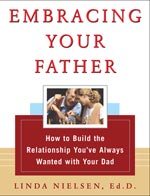Dads and daughters: WFU professor explains how to develop closer ties
 The sometimes rocky road from childhood through adolescence can lead to a less than perfect relationship between fathers and their adult daughters, according to a Wake Forest University professor of education and women’s and gender studies.
The sometimes rocky road from childhood through adolescence can lead to a less than perfect relationship between fathers and their adult daughters, according to a Wake Forest University professor of education and women’s and gender studies.
In her new book “Embracing Your Father: How to Build the Relationship You’ve Always Wanted with Your Dad” (McGraw-Hill, May 2004), Linda Nielsen offers practical advice for adult daughters to develop closer ties to their fathers.
Ages 14 to 18 are often the most uncomfortable times, says Nielsen, who wrote the textbook “Adolescence: A Contemporary View.” And, divorce and remarriage can present even more hurdles for the father-daughter relationship. Learning more about their fathers — their histories and why they made certain choices — can help daughters get past some of the relationship roadblocks and reconnect with their dads.
“No matter how old you and your father are now, getting to know each other on a more personal, more emotionally intimate level will deepen your bond,” she says. “For example, have your dad choose 10 pictures of himself throughout different periods of his life. Then spend several hours alone with him looking them over and encouraging him to tell you stories about his life.”
Nielsen’s book includes dozens of quizzes and worksheets she developed during 10 years of teaching her “Fathers and Daughters” course for Wake Forest students. Many of the activities address what she describes as the “slippery slopes” for the father-daughter relationship, including issues related to money and work, negative beliefs about fathers, communication, divorce and remarriage. Here are a few of the many questions Nielsen suggests daughters ask: When you were young, what did you hope for in terms of work and money? What are your greatest strengths and weaknesses as a father? What was hardest about being a father when I was an infant? A teenager?
“Start with a letter or an e-mail,” suggests Nielsen for those who have a long way to go to build a good relationship. “A written message has several advantages: you can calmly think about what you want to say and how you want to say it. And, your father will have time to think about how he wants to respond.”
Above all, Nielsen suggests that daughters spend more time alone with their fathers. “When it’s just the two of you, more meaningful conversations can take place,” she says.
Research shows that women typically spend more time and share more personal information with their mothers than their fathers throughout their lives. So, Nielsen suggests treating fathers more like mothers. That might include occasionally asking to speak to your father first when calling home if that is not something you usually do.
“If you share day-to-day events with your mother, you should try sharing them with your father. This gives each parent the opportunity to have the same kind of intimacy with you. Most daughters don’t give fathers the chance to form that kind of emotional intimacy.”
Fathers and daughters can have a difficult time talking to each other about personal things because men and women often communicate in different ways, Nielsen says. “Women are taught to discuss feelings, while men are taught to nurture people by giving advice about how to ‘fix’ whatever is bothering them.” Not expecting fathers to talk like women can improve the relationship.
“Every daughter I know who has reached out and tried to strengthen her relationship with her dad, regardless of the outcome, feels better about herself,” Nielsen says.
The relationship between fathers and daughters does not get enough attention, according to Nielsen. “Many books are written for fathers about becoming better fathers, but this is the first book that exclusively focuses on how adult daughters can improve their relationship with their fathers. I want daughters to assume the responsibility, to take the initiative and to do things differently in order to improve the relationship.”
Categories: Arts & Culture, Research & Discovery, University Announcements
Media Contact
Cheryl Walker
media@wfu.edu
336.758.5237



